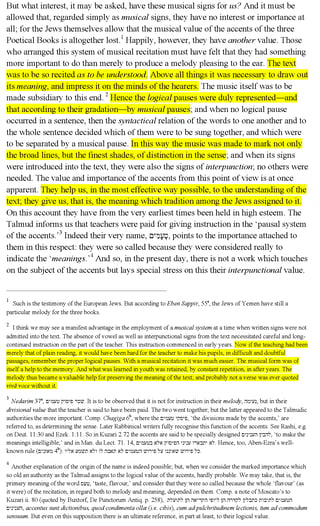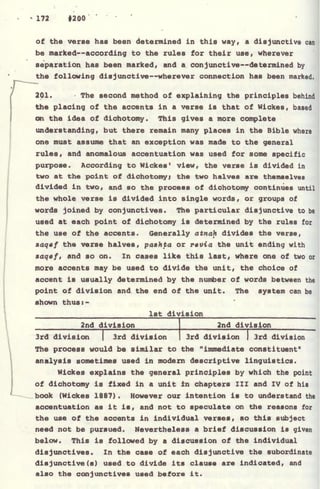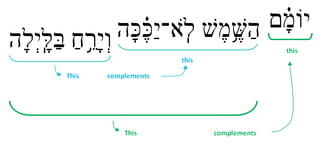The Idea in Brief
The verse is not speaking about any harm from the sun (or even the moon), but instead speaks to harm that occurs night and day; in this respect, the psalmist speaks to divine protection 24/7, which encompasses the time period during the time of the sun (daytime) and time of the moon (nighttime).
Discussion
The Tehellim were sung, and the way this verse was sung in this Psalm had placed a logical pause after the first word according to the system of cantillation. Please click on the image below to enlarge.

At this juncture, the following paragraphs explain why cantillation is important to understand how they relate to the meaning of verses.
The role and meaning of cantillation in Hebrew Scripture
During the 19th Century, the Bible scholar Dr. William Wickes reintroduced and brought new perspectives to light concerning Hebrew cantillation, and how this cantillation was in direct relation to the logical parsing and arrangement of the verses of the Hebrew Bible. That is to say, the cantillation not only provided the musical accompaniment, but set the logical arrangement of Hebrew verse. In this regard, Dr. Wickes writes the following in the introduction to the first volume of his book based on his observations from the Talmud and other rabbinic sources.
Please click this image to enlarge or view the source online

In this regard, the written cantillation provided both the musical and logical arrangement of the Scriptures based on a system of divisions (or dichotomy), for which Dr. Wickes writes an entire chapter. In summary, this system of divisions and sub-divisions enabled the listener of the Scripture to (a) enjoy the Scripture musically, (b) understand the Scripture logically, and (c) memorize the Scripture systematically.
The conclusions of Wickes were affirmed by the late Jewish scholar, Profesor Israel Yeivin, from Hebrew University in Jerusalem. The following source citation (below) comes from Page 172 of his book, Introduction to the Tiberian Masorah (Atlanta: Society of Biblical Literature, 1980).
Please click on the image below to enlarge.

Simplified Version of the Division
Based on the explanations noted in the previous paragraphs, the following is my own rendering of the logical division of this verse in order to better explain the idea. Please note that the first word of the verse (where the main division occurs) is modified by the remainder of the verse, which is also sub-divided. This second part (with the sub-division) becomes the logical complement of the first word.
Please click on the image below to enlarge.

So, based on the cantillation division -- marked by the Great R’bhîa (ְבִיעַ גָּדוֹל) and Little R’bhîa (רְבִיעַ קָטוֹן) -- the phrase mentioning the moon complemented the phrase mentioning the sun, and this entire clause, in turn, modified the first word of the verse (day).
In other words, the gist of the verse is that the Psalmist was singing about the experience of divine protection 24/7, because the “day” is defined as the time during the presence of the sun, which is complemented by the time during the presence of the moon. This time encompasses what the Psalmist calls a “day.”
Therefore it is neither the sun or the moon that is hurting anyone, but instead it appears that harm is the implicit subject. This interpretation also appears in the Targum, but is more explicit.
Targum Psalms
The Targum Psalms makes it clear that the sun and the moon are not the subjects of the verb, but the subject instead is the harm that occurs during the mornings and nights. Please click on the image below to enlarge.

My own literal word-for-word translation from the Aramaic is as follows:
Tehellim 121:6 (Targum)
6 In daytime during the ruling sun, the mornings will not strike you nor the nights during the ruling of the moon in the nighttime.
Please note that the Targum moves the emphasis away from the sun or the moon as the subject of the verb, and instead implies harm during the times of the mornings (when the sun is present) and during the times of nights (when the moon is present). The idea here then is divine protection 24/7.
In conclusion, the Targum Psalms was composed before the 5th Century, according to the Jewish Encyclopedia. Several years later in the 9th and 10th centuries, the Masoretes codified the Masoretic Text, which ascribed cantillation marks to the Scriptures based on the logical division of words and phases. In other words, the prevailing oral tradition understood in the 5th Century again appears in the 9th and 10th Century, when the Masoretes codified the Hebrew Bible.
In summary, from the perspective of these two sources, the interpretation of this verse indicates that the Psalmist proclaimed divine protection 24/7, which encompasses the time period during the time of the sun (daytime) and time of the moon (nighttime).





